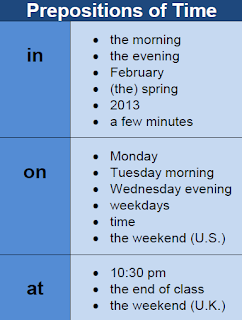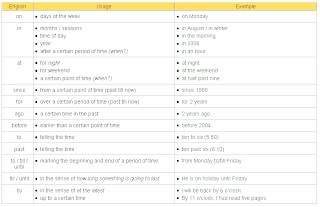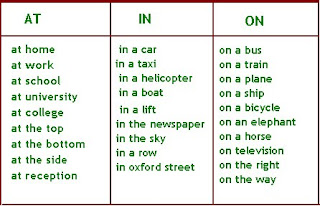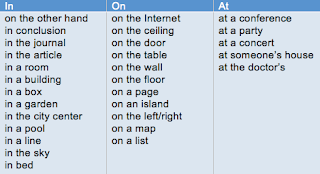EnglishFace RJ
Página destinada a informar, divulgar, esclarecer dúvidas e ajudar no desenvolvimento e aperfeiçoamento do Inglês como segunda língua.
quarta-feira, 18 de setembro de 2013
TO or FOR ?
Don’t say: “I’m studying every day for improve my English.”
Say: “I’m studying every day TO improve my English.”
The prepositions to and for are very easy to confuse! Here are some rules:
Use TO in these cases:
Destination
“We’re going to Paris.”
What time it is
“It’s a quarter to 2.”
Distance
“It’s about ten miles from my house to the university.”
Comparing
“I prefer sleeping to working.”
Giving
“I gave the book to my sister.”
Motive/Reason – with verb
“I came here to see you.”
Use FOR in these cases:
Benefits
“Yogurt is good for your digestion.”
Period of time
“We’ve lived here for 2 years.”
Schedule
“I made an appointment for May 3.”
Agree with
“Are you for or against the development of nuclear weapons?”
Doing something to help someone
“Could you carry these books for me?”
Motive/Reason – with noun
“Let’s go out for a drink.”
Function – with verb (-ing form)
“A ladle is a big spoon used for serving soup.”
As you can see in TO or FOR can be used for a motive/reason, but TO is always with a verb, and FOR is always with a noun. Here’s a good example:
I came to New York to work.
I came to New York for a new job.
Taken from EspressoEnglish
sábado, 14 de setembro de 2013
Say x Tell x Speak x Talk
|
Uses
|
Examples
|
|
| Say |
used with direct and indirect speech Say is most often used without a personal object. If we want to put a personal object after say, we use to. |
She said that it was my last chance. He said, ‘Good morning.’ She said that she would be late. (not And I say to all the people of this great country... |
| Tell |
used with direct and indirect speech after tell, we usually say who is told, i.e., tell someone something only used to mean ‘instruct’ or ‘inform’ Tell is used to tell someone to do something Tell is not used before objects like a word, a name, a sentence, a phrase. We do not usually use it after tell to refer to a fact. tell someone again (repeat) |
She told me that she would be late. She told me that it was my last chance. (not Tom’s mother told him to clean his room. Alice said a naughty word... (not ‘I’ll tell you tomorrow.’ (not I’ll tell you it tomorrow.) ‘I don’t want to tell you again to get your homework done.’ |
| Talk |
There is not very much difference between speak and talk. Talk is the more usual word to refer to conversational exchanges and informal communication. |
When she walked into the room everybody stopped talking. |
| Speak |
is often used for one-way communication and for exchanges in more serious or formal situations. Speak is the usual word to refer to knowledge and use of languages. |
I’ll have to speak to that boy -- he’s getting very lazy. After she had finished reading the letter, nobody spoke. She speaks three languages fluently. |
quarta-feira, 11 de setembro de 2013
Word of the Day
REGARDLESS - despite; not being affected by something ( in Portuguese we would say "independentemente" or "de qualquer modo" or "apesar de").
Example:
-The plan for a new office tower went ahead regardless of local opposition.
-She knew it was dangerous to visit him except at night, but she set out regardless (of the risk).
-This job is open to all, regardless of previous experience.
Example:
-The plan for a new office tower went ahead regardless of local opposition.
-She knew it was dangerous to visit him except at night, but she set out regardless (of the risk).
-This job is open to all, regardless of previous experience.
terça-feira, 10 de setembro de 2013
sábado, 7 de setembro de 2013
Assinar:
Postagens (Atom)




